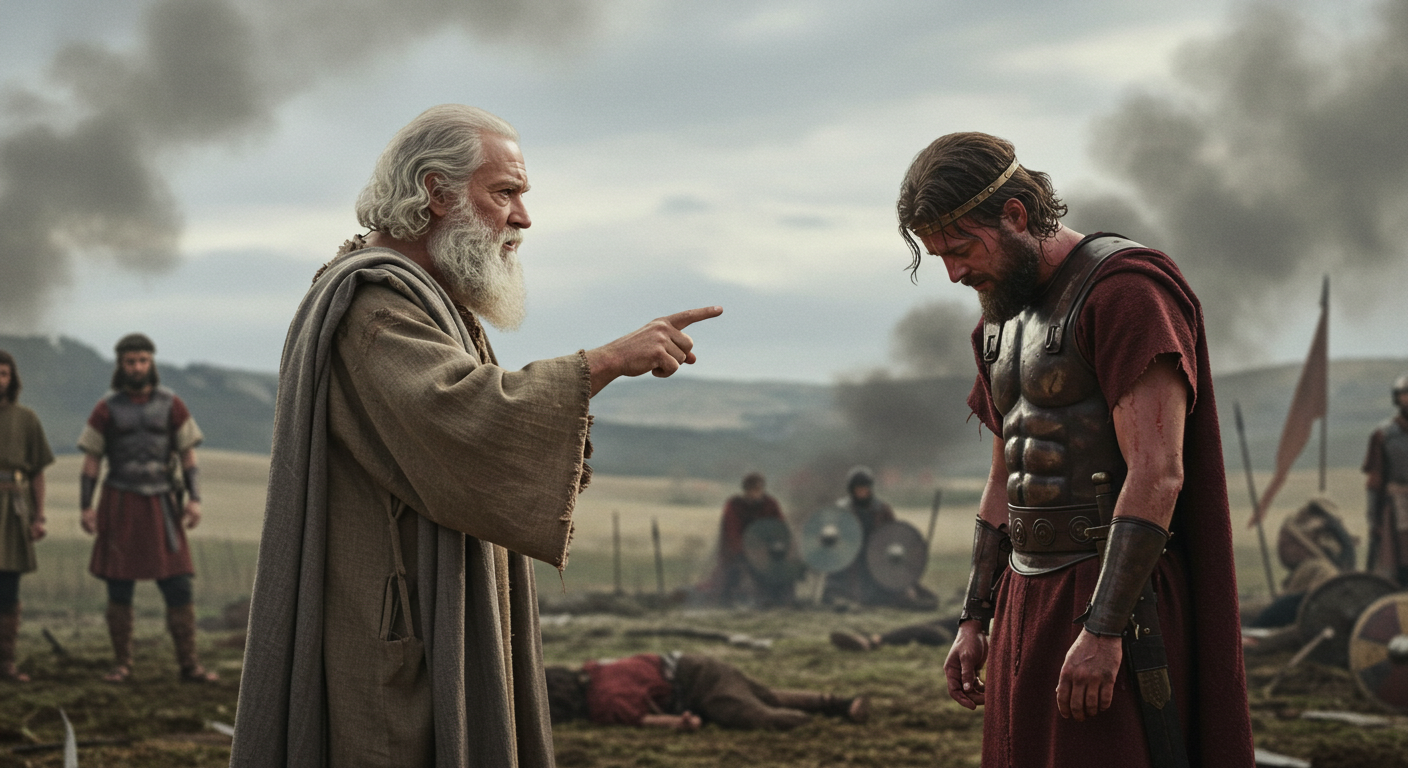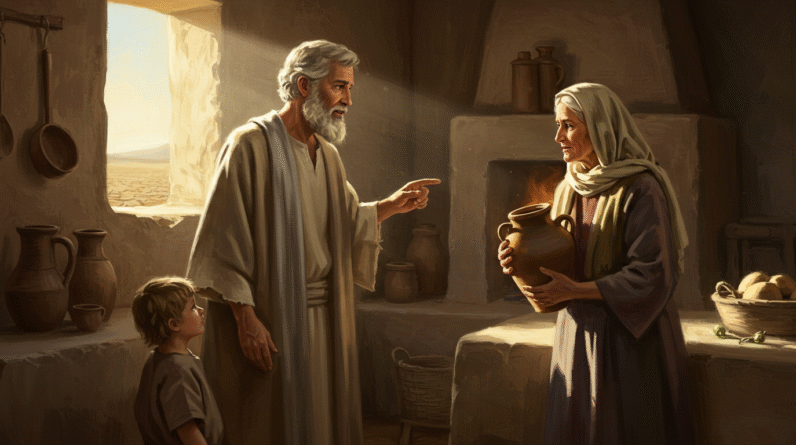Samuel’s Rebuke to Saul: When Obedience Matters Most
In the tapestry of biblical narratives, some stories stand out for their dramatic interplay of faith, obedience, and consequence. One such story is when Samuel rebukes Saul. It is a narrative that has echoed through the ages, offering lessons not just of ancient theology but of timeless human nature. As we unravel this story together, let’s dive into how disobedience leads to downfall and why, at times, obedience matters most.
The Rise of Saul
Imagine the scene: the people of Israel, longing for a king to lead them into battles and victory, choose Saul. He fits the bill perfectly—tall, handsome, and from a respected tribe. He seemingly has everything going for him. Yet, beneath the surface, Saul’s story is about more than just kingship; it’s about the challenges that come when personal desires clash with divine directives.
When Saul first steps onto the stage as king, he has the support of both his people and the prophet Samuel. Samuel is the spiritual compass for Israel, offering divine guidance and wisdom. At this point, Saul’s journey seems poised for success. But as we often see in stories of power, the real test lies in how one handles it.
The Command from God
Every story of rebellion starts with a command. And for Saul, this command was clear. In 1 Samuel 15:1-3, God instructs Saul through Samuel to completely destroy the Amalekites, leaving nothing behind. Saul’s mission is not just a battle; it is a divine order meant to fulfill a long-standing divine judgment against a nation that opposed Israel. God’s instructions are unequivocal, leaving no room for half-measures or personal interpretation.
In our own lives, commands or instructions come in various forms. Sometimes they are clear directives, while other times they manifest as a sense of knowing the right path. It is in how we respond to these moments that our character is tested, just as Saul’s was.
The Disobedience of Saul
Here’s where the story begins to unravel. Samuel rebukes Saul, a scene that is all about what Saul failed to do. Instead of executing the command as given, Saul spares Agag, the king of the Amalekites, and takes the best of the livestock. Perhaps he rationalizes his actions by thinking he’s saving the best for sacrifices to God. However, this thoughtful gesture is not what was commanded.
When you read 1 Samuel 15:9, you can sense the dissonance between what was expected and what was executed. It’s this gap that often exists in our own lives between intention and action. We aim to follow through on what we know is right but can get sidetracked by personal desires, fears, or misunderstandings.
Samuel Confronts Saul
There comes a time when every action meets with accountability. For Saul, this comes in the form of Samuel’s rebuke. Picture it: Saul, thinking he’s been clever or perhaps even merciful, is confronted by a fuming Samuel. 1 Samuel 15:13 shows Saul greeting Samuel with assurance, “The LORD bless you! I have carried out the LORD’s instructions.” But has he, really?
Samuel rebukes Saul in the verses that follow, asking scathing, confronting questions. The prophet listens to Saul’s excuses and rationalizations with a stern ear, providing a focus not merely on compliance but on adherence to God’s will. We are reminded here that true obedience does not twist or tailor commands to fit our desires.

Disobedience’s Consequences
This part of the story is a poignant reminder: Saul’s kingship is forever altered. Samuel conveys God’s message that the kingdom will be torn from Saul and given to someone more deserving. If you ever wonder about the consequences of straying from what you know is right, Saul offers a cautionary tale.
In 1 Samuel 15:22-23, Samuel speaks some of the most quoted words of scripture: “To obey is better than sacrifice.” It’s a powerful reminder that outward actions, no matter how sacrificial, mean little if they come from a heart not aligned with divine instruction.
The essence here is not that sacrifices or offerings are unimportant, but that they are meaningless if disconnected from a posture of heartfelt obedience.
Reflecting on Obedience in Our Lives
As we reflect on how Samuel rebukes Saul, it calls us to examine our own walk with obedience. Are there situations where we choose our convenience over what we know to be right? Do we sometimes modify instructions to fit personal narratives or comfort zones? Saul’s story invites us to think deeply about how we align our actions with the truths we profess.
The Importance of Humility and Listening
Humility is often the unseen virtue in biblical tales, and in this narrative, it is pivotal. Part of Saul’s downfall is his inability or unwillingness to listen fully and submit wholly. The journey toward obedience is frequently paved with listening, and listening well. Perhaps there are times when you are called to pause and hear more than just what’s spoken; to perceive what lies behind the words, much like when Samuel rebukes Saul.
The Ripple Effect of Decisions
Every significant act of disobedience affects more than the individual. Saul’s disobedience had lasting implications for his lineage, leadership, and Israel’s future. We may not wield the same political power, but each choice we make can ripple into larger realms, influencing relationships, opportunities, and spiritual journeys.
The next time you stand at a crossroads of choice, consider not just the immediate outcomes but the broader impact. Reflect on how obedience or disobedience may ripple through life’s fabric.
Samuel’s Legacy and Lessons
While Saul’s story is one of warning, Samuel’s legacy offers insights into steadfastness and faithfulness. Samuel consistently serves as a bridge between divine will and earthly execution, a role that embodies patience, wisdom, and courage.
When Samuel rebukes Saul, it is more than a moment of correction; it is a fulfillment of Samuel’s duty to represent God’s justice and truth. And perhaps, in some small way, we are also called to emulate this balance of speaking truth with love and conviction.
The Unseen Call to Be Samuel
Perhaps you are not a king like Saul, but maybe there are moments in life where you are the Samuel in someone else’s story. This narrative encourages exploring how we can lovingly and constructively hold others accountable while being receptive to correction ourselves.
We may also consider the importance of being in communities that nurture truth-telling and accountability, echoing the role that both Samuel and Saul play in the Israelite community.
Applying the Story to Modern Lives
Saul’s story might seem rooted in a distant past, but its core themes reverberate through modern life and challenges. Obedience, understanding authority, and handling responsibility are as relevant today as they were then.
Consider how you interpret and execute personal and spiritual directives. Look for ways to discern divine guidance amidst the noise of modern life. Whether it is in everyday tasks or life-altering decisions, let this story remind you of the profound impact of choosing obedience.
The Personal Journey of Obedience
Each person’s journey with obedience is unique. It might come naturally to some, while others may wrestle with it through life’s seasons. It’s essential to acknowledge where you stand in your relationship with obedience, accepting the struggles alongside the triumphs.
Continue seeking resources and communities that foster growth in obedience and spiritual practice. Whether it’s engaging in group studies, reading spiritual works, or personal meditation, pursue what strengthens your alignment with what you perceive as right and true.
Conclusion: The Power of Stories and Self-Reflection
When Samuel rebukes Saul, he offers more than a critique—he provides a narrative of the significance of obeying divine commands. It challenges us to examine our paths and decisions, embracing the responsibility that comes with knowledge and authority.
As you ponder the implications of this story, consider how it might inform your journey toward deeper alignment with your beliefs and values. Remember, every life is made up of moments and decisions that reflect where our loyalties and priorities lie.
Explore More
For further reading and encouragement, check out these posts:
👉 7 Bible Verses About Faith in Hard Times
👉 Job’s Faith: What We Can Learn From His Trials
👉 How To Trust God When Everything Falls Apart
👉 Why God Allows Suffering – A Biblical Perspective
👉 Faith Over Fear: How To Stand Strong In Uncertain Seasons
👉 How To Encourage Someone Struggling With Their Faith
👉 5 Prayers for Strength When You’re Feeling Weak

📘 Jesus and the Woman Caught in Adultery – Grace and Mercy Over Judgement
A powerful retelling of John 8:1-11. This book brings to life the depth of forgiveness, mercy, and God’s unwavering love.
👉 Check it now on Amazon
As a ClickBank Affiliate, I earn from qualifying purchases.
Acknowledgment: All Bible verses referenced in this article were accessed via Bible Gateway (or Bible Hub).
“Want to explore more? Check out our latest post on Why Jesus? and discover the life-changing truth of the Gospel!”








